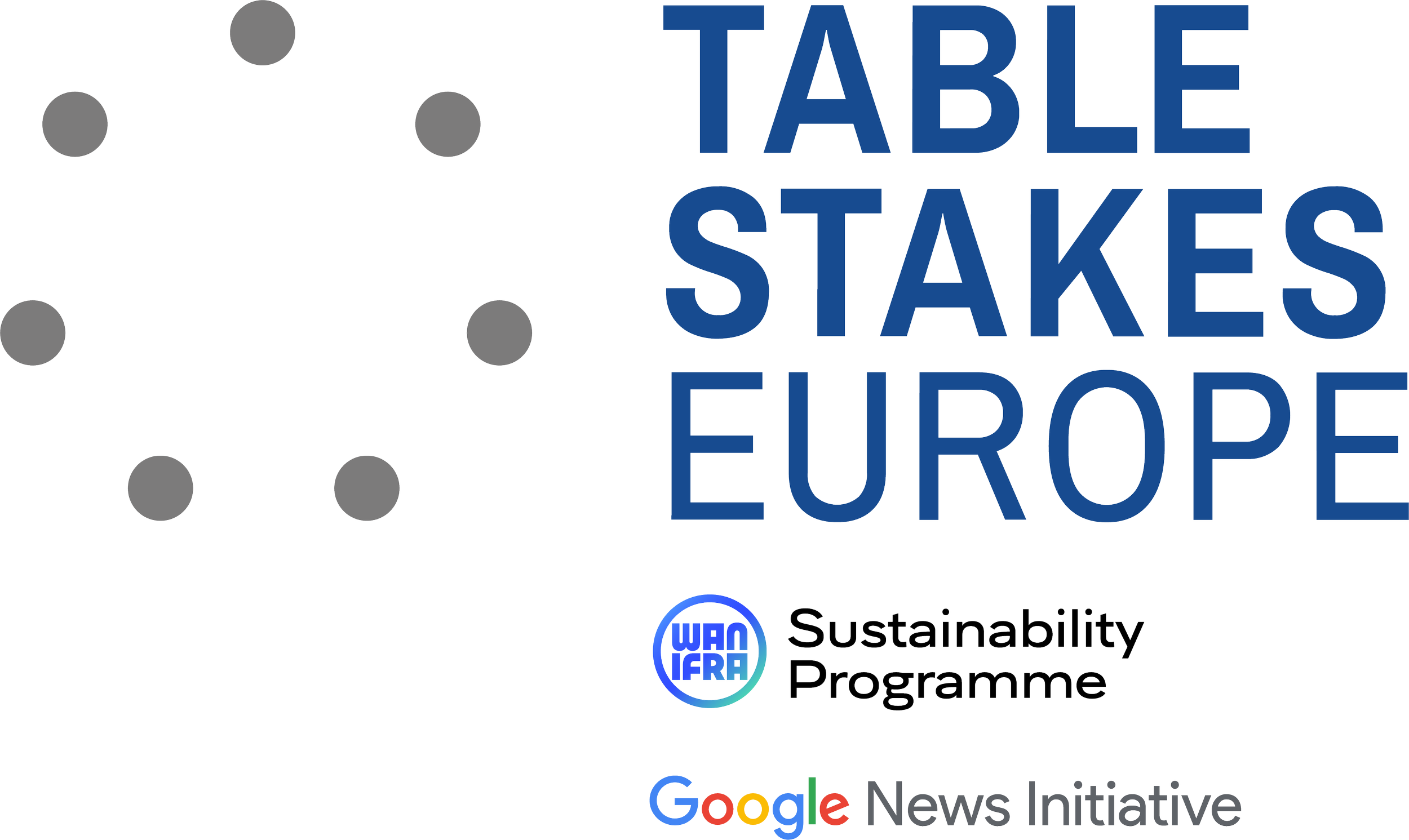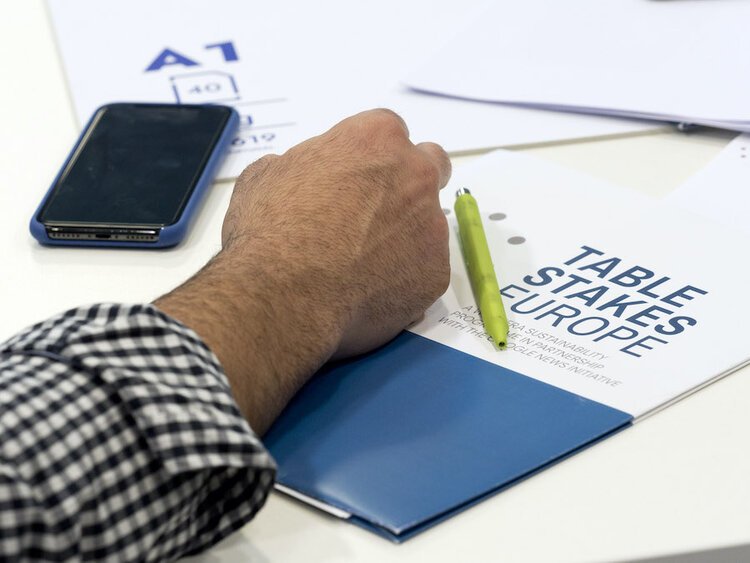How to Apply
Applications for the fifth edition of Table Stakes Europe are now closed.
This opportunity is for leaders in local and regional news organisations who commit themselves and their enterprises to address the most critical challenges faced by their companies and the industry today – and to use the proven model of Table Stakes plus performance-driven change to succeed at those challenges.
Click below to read each criteria:
+ ELIGIBILITY
All participants must be from Europe (defined geographically). In addition, and while we may make a small number of exceptions, the following are eligibility criteria. We’re looking for 24 news enterprises from a minimum of two nations and hopefully three or more to participate in the Programme. These news enterprises will
- Publish daily or weekly
- Serve local or regional audiences - or potentially national audiences in smaller countries. May also be part of a larger group
- Have reasonably good English language skills among leadership and staff (though note our coaching team will include native skills in French, German and Spanish)
- Either already have digital subscription or membership offerings
- or, are presently committed to put those in place
- or, are open to consider other audience focused revenue sources.
- Either are WAN-IFRA members – or will become members prior to the kickoff of the Programme
- Commit upfront and in writing to identify a core initiative/challenge facing the enterprise, define success at that initiative/challenge and do the work needed throughout the program to succeed NOTE: we’re interested to hear from companies that don’t precisely meet the criteria above, for example local radio or TV. Just get in touch and let’s have a discussion.
+ SELECTION CRITERIA
- Commitment to the programme
- buy-in from CEO and Chief Editor, able to send at least 2 people to participate in each workshop. This is usually a written commitment to do the work needed for success
- able to demonstrate strong interest - e.g. background reading, applied already to previous rounds
- selected participants have clout in the organisation - i.e. ability to persuade and work with other colleagues as needed
- Level of potential benefit
- success at the challenge identified will take the publisher to a significant new level of journalistic and financial sustainability
- Already some idea of the core challenge
- and TSE challenge is one of the organisation’s three top priorities right now
- Benefit to other publishers in the programme
- can bring new perspective (e.g. true product focus) / interesting experiences/skills and approaches that have worked
- Happy to share case studies & showcase them at WAN-IFRA or GNI events
- Are committed to building journalistic and financial success through delivering value to local audiences as opposed to cost-cutting Assuming Basic Criteria are met, those with a strong case in each of the five Qualitative Criteria above can be accepted immediately into Round 2 by the TSE team. We will most likely reach out for a personal meeting or discussion as part of this process. The TSE team reserves the right to make a final selection that works best for the overall programme and achieves the right balance of team dynamics, geography and language.
+ PERFORMANCE CHALLENGE
The challenge-centric, performance-and-accountability change methodology uses a performance challenge as the vehicle through which participating news enterprises identify and close shortfalls in the core table stakes, the audience-first approach and digital transformation. Most change efforts fail because they violate a core principle: Performance results are the primary objective of change, not change activities. Instead of falling into the change-for-the-sake-of-change trap, participants will identify and commit to success against a performance challenge that meets the following criteria:
- One of the 2 to 3 most important challenges facing the enterprise
- Requires the CEO/whole enterprise perspective: the challenge ought to take 12 to 20 months to achieve performance against the challenge
- Something several to many people across the enterprise must contribute to
- Closes shortfalls/gaps in the 7 core table stakes
- Is behaviour-and-skill driven; that is, performance success requires people to learn new behaviours, skills and/or working relationships
- Is not “business as usual”
- Is something news enterprise leaders and challenge teams will feel at risk about when they ‘go public’ – that is, openly commit themselves to success
- Is “ripe” and credible: that is, it makes sense for the enterprise to take on this challenge at this time in light of local market realities, the enterprise’s strategy and so forth
+ NATURE OF PARTICIPANT COMMITMENT
Participating news enterprise leaders, as well as challenge teams, must commit themselves to the work required for success. While scepticism is okay in the sense of somewhat normal human behaviour and, often, an admirable journalistic attribute, participants cannot succeed if that scepticism keeps them on the sidelines instead of enthusiastically in the game. Consequently, we will ask the top leaders of participating news enterprises to sign a commitment letter that spells out what is required. As one part of this, selected news enterprises agree to pay their own travel and travel-related expenses to the in-group sessions. Once a challenge has been identified and defined, participating news enterprises are expected to name challenge-teams to own and deliver success against the challenges. These teams will likely include individuals from the newsroom, consumer-facing technology, and marketing, advertising and business. In addition, though, and depending on the specific challenge selected, others on the teams might include high potential younger leaders; product and/or audience managers; and, folks who work at corporate centres in cases where the news enterprise is part of a larger organisation.
+ QUESTIONS IN THE APPLICATION FORM
Level of fluency in English of people across your enterprise? Basic info including:
- What kind of audience are you targeting?
- Number of households in your market area?
- % total revenue comprise by print advertising, print circulation, digital advertising, digital subscription
- Number of subscribers: print, print & digital (bundled), digital-only
- Digital audience, monthly unique visitors
- Page views per visit
- Time spent per visit
- Traffic sources: Direct as % of total
We also ask for the contact details of up to 4 key people in your organisation.
What is the headcount (total number) of people who work in your newsroom? Has it grown in recent years? has is shrunk/decreased in recent years?
Describe the primary gaps in skills, roles, workflows, technology or other aspects of your enterprise that affect your efforts to be a market-leading, profitable, digital publisher
Describe what you see as the most important challenges your news enterprise faces – and to whom success at those challenges matter and why?
What current initiatives, if any, do you have underway that address these challenges?
What challenges might you choose to take the fullest advantage of Table Stakes? (NOTE: your chosen challenge for Table Stakes can be changed/refined later in the first workshops)
Send us your questions

